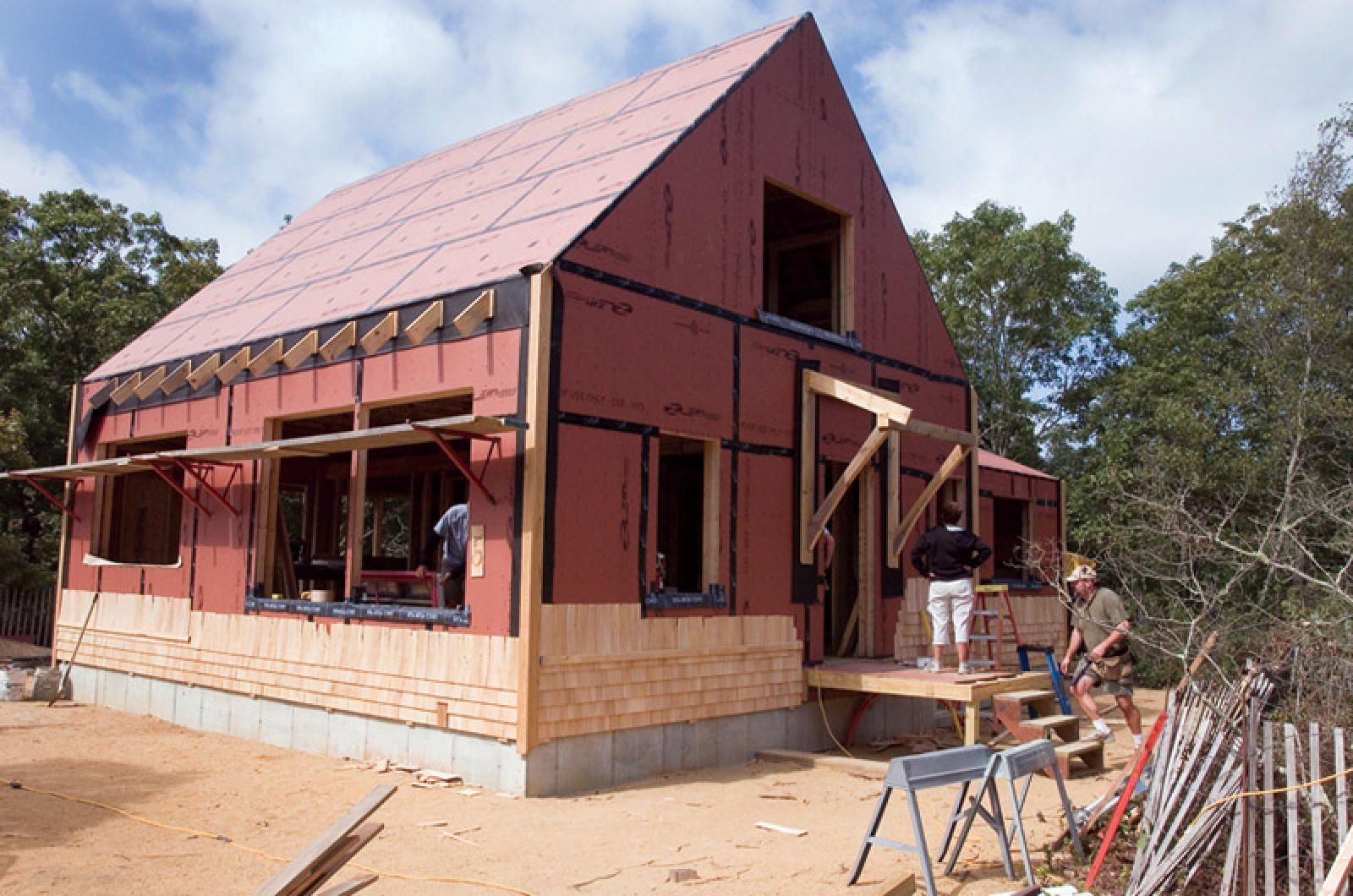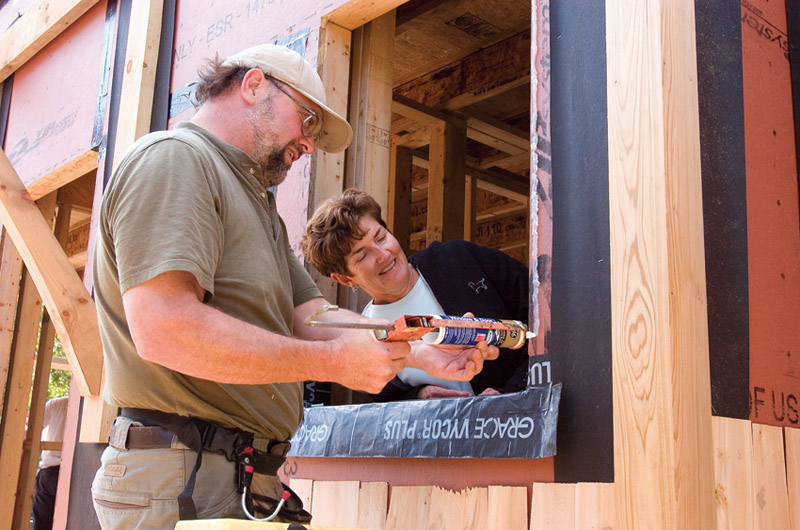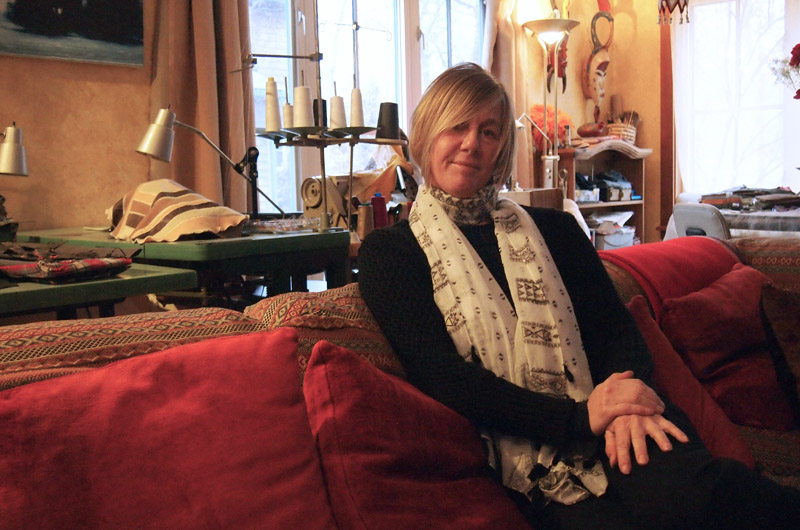Surrounded by flowers at Morrice Florist on a recent afternoon, owner Emily Coulter recalled a selectmen’s meeting seven years ago that changed her life. It was July and the Tisbury town hall was unbearably hot. The families in attendance quietly braced themselves as the first name was drawn from a wooden box.
Mrs. Coulter and her husband Benton had taken part in two other housing lotteries in the past, but this time the months-long process ended in celebration. Theirs was the first name drawn from the box. The whole ceremony was over in a matter of minutes.
“It was crazy,” Mrs. Coulter said. “We actually got our picture in the paper.”
Three months later, the Coulters moved into their new home on Lambert’s Cove Road, one of four similar houses built for year-rounders who would otherwise find home ownership out of reach. The Coulters paid $258,500 for their house, which will remain affordable by Island standards for at least 99 years.
Eighty-eight similar dwellings on the Island have been built and allotted since 2005, each one with a deed restriction, ground lease or other mechanism to keep it affordable.
The home ownership lottery system, today overseen by the Dukes County Regional Housing Authority, has made a significant dent in the housing problem on the Island by allowing at least some young families to put down roots. Many other houses and apartments around the Island are kept affordable through similar long-term agreements. But for many families, it’s still a stretch.
“It’s affordable for Martha’s Vineyard, but it’s like a normal house anywhere off-Island,” Mrs. Coulter said of her 1,260-square-foot house, one of 66 new homes built by the nonprofit Island Housing Trust since 2005. “We do really well, but there is no way that we would be able to afford a regular house.”
But overall, she said, the investment has been a good one.
“The life we’ve created for ourselves with the security of having that house is everything we had dreamed of,” Mrs. Coulter said. “I was able to buy this business here. Knowing that we have such strong roots now, there is no need for us to ever leave.”
While the Coulters own their house outright, the Island Housing Trust holds a 99-year ground lease for the property. Homeowners can sell, but only for what they paid, as adjusted to keep up with changes in the area median income, about $65,500 in Dukes County. Housing trust director Philippe Jordi said that after 99 years the lease is renewed, ensuring that the houses stay affordable in perpetuity. The ground lease model has been adopted in other affordable housing projects around the country.
“The community’s interest is vested in the fact that we own the land,” Mr. Jordi said. “We want to ensure that they are successful and when they go to sell their house that it be sold to a household with the same needs,” he said.
The trust also maintains 17 rental units, most with long-term restrictions. Another 29 are in development.
The houses on Lambert’s Cove Road are limited to households earning between 80 and 100 per cent of the median income, roughly $52,400 to $65,500. Other developments have targeted lower or higher income levels. The vast majority of Island dwellings for people earning less than 60 per cent of the area median income are rentals. Habitat for Humanity, which has built 10 houses on the Island with another project coming up this year, focuses on the 60 to 80 per cent income range.
Almost every affordable housing development on the Island since around 2000 has been restricted in perpetuity, a change from 20 years ago, when restrictions of 30 years or less were more common.
“It’s the only thing that makes sense in an area where real estate values go as high as they do as quickly as they do,” said Doug Ruskin, a housing trust board member who has also served on the board of Habitat for Humanity and the Edgartown affordable housing committee. The housing trust and Habitat for Humanity separately adopted the approach more than a decade ago.
But while long-term restrictions are now the norm, a new project in Edgartown could end up bucking the trend.
A plan to make three affordable housing lots on Sixth street would carry affordability restrictions of only 10 years.
Edgartown selectman Arthur Smadbeck, who is helping organize the project, has argued that the shorter-term restriction would allow families to benefit from building home equity for the future. “The idea is that we are trying to give a leg up to the young people who are going to come to live here for a good long time,” he said. A public lottery is expected this month.
Mr. Ruskin has opposed the project, arguing that it would simply provide a windfall to future owners, who would be able to sell their homes at market rate after 10 years. Dukes County Regional Housing Authority director David Vigneault said he sees that kind of approach less as affordable housing than as a delay on market-rate housing.
“The question boils down to: Is it primarily a housing program, or a personal finance program?” Mr. Vigneault said. “At a certain point does it go from being one to the other?”
Homesite and housing lotteries may include a requirement for town residency, which disqualifies them from being counted on the state inventory of affordable housing. The inventory also excludes lottery projects where a preference for town residents is applied to more than 70 per cent of the units.
But Island officials are less interested in the state inventory than in creating more attainable housing in general. “The driving criteria is that we have hundreds of families looking for stable housing, and we have effectively zero 12-month leases available on this Island,” Mr. Ruskin said. “I haven’t seen an advertisement for one in the paper for a long time.”
He said Chapter 40B of the state general laws, which allows developers to push through some projects that include affordable housing, has little influence here, given the high cost of development and the regulatory powers of the Martha’s Vineyard Commission.
By all accounts, the home lotteries have been a godsend for year-round residents. “Their entire lives change,” Mr. Ruskin said. “They don’t have to worry anymore, stress levels go down, kids do better in school. In a number of cases, folks have been able to stabilize to the point of opening their own little businesses.”
But it has not always been smooth sailing.
Christie Phillips, a seamstress and single mother, was awarded a home at Island Co-Housing in West Tisbury in 2000.
“I couldn’t believe I got a house,” Ms. Phillips said in a recent interview, surrounded by sewing machines and spools of thread in her small two-bedroom house with a fire blazing in the wood stove. “Back then, nothing was under $500,000.” She paid about $135,000, and was among the first to move in to the 16-unit collaborative-living project in the woods off State Road. “It felt a little utopian in the beginning,” she said.
But she soon found herself struggling over monthly association fees that she said required the four affordable and 12 market-rate owners to pay the same rate. She spent years fighting to bring the fees down, noting a split within the cooperative living community.
“All the affordables were always trailing behind,” she said. “We could never make ends meet.” She pointed to a thick binder filled with legal documents and town bylaws. Affordable home owners weren’t supposed to pay anything in association fees, she said, but her efforts led nowhere. “It was so slanted against us,” she said. “It was like we were just used to make this community 40B.”
Ms. Phillips has stopped attending meetings at Co-Housing, although she still considers herself lucky to own a home. “I’ve had some problems,” she said. “But I do appreciate that I have a house for $135,000.” She also noted that while a number of households in the development have come and gone over the years, only one affordable unit has been resold, following the death of the owner.
Mrs. Coulter said if she were ever to sell her home, it would simply go back into the lottery system. Some feel the process creates an unfair burden, since the most an owner can hope for is to break even, but Mrs. Coulter sees things differently. Looking back on her years of paying $1,200 a month with her husband for an un-heatable one-bedroom apartment, she said the difference is night and day.
“The idea that we’re putting equity into something now — if we were to sell it we would make our money back — that’s an amazing investment,” she said. “I think everyone who has moved into these houses is just so thankful.”








Comments (6)
Comments
Comment policy »